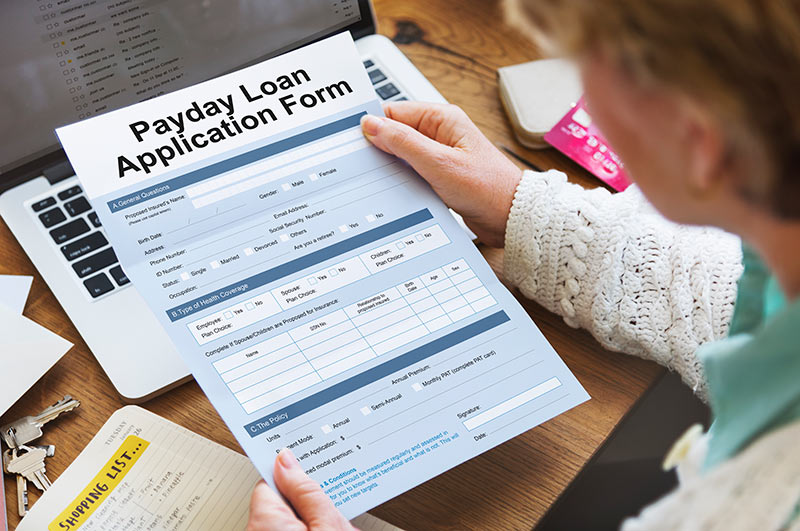Payday Loans Vs. Personal Loans
If you need money prior to your next paycheck, there are several ways you can get a loan to choose from. Here we cover the differences between payday loans vs. personal loans and how to select the right one for you.
A payday loan is one way. Although it’s simple to apply for, this kind of loan can be quite costly. Payday loans may include hidden fees as well as exorbitant interest rates. Even if you only borrowed a small amount, fees or rates could be excessive., this makes it quite simple to fall into a debt spiral where it is difficult to repay a loan, it is extremely hard.
A personal loan is another choice. Although applying for such loans is a little more difficult, the rates of interest are significantly lower as compared to payday loans. Personal loans are therefore a much safer way to get credit and can be utilized to consolidate debt.
Payday vs. Personal Loans –What’s The Difference?

There are several parallels between payday loans as well as personal loans. First, you borrow the money with both loans, and you must pay it back with interest at a later time. Both mortgages can be used to pay for emergencies as well as unforeseen expenses or other financial commitments.
These loans may vary greatly from one another. The typical purpose of payday loans is to borrow a small amount of cash until your next payday. They are also quite simple to apply for. However, these loans have the potential to be exceedingly expensive and don’t require any form of collateral. As a result, they are frequently regarded as predatory lending since they have exorbitantly big interest rates, do not take into account a borrower’s capacity to repay, and have unstated terms that impose additional costs on borrowers.
The category of personal loans is substantially larger. You will often need to provide creditors evidence that you can return back the loan because this loan is generally offered by an institution, credit union, or web personal loan lender. Compared to payday loans, private loans are often for significantly greater sums of money, but the repayment period is much longer. In comparison to payday loans, personal loans have substantially lower interest charges and fees, which means that overall borrowing costs will probably be much cheaper.
Here are a few major differences between payday loans vs. personal loans summarized.
The Amount Being Borrowed
While most lenders for personal loans have borrowing limits of $1,000 to $50,000, others offer greater ones of $100,000. In contrast, payday loans are often small-dollar loans with a $500 maximum.
The Loan Term
A personal loan typically has a repayment period of three to seven years, though certain lenders may provide longer or shorter terms. However, if you take out a payday loan, you’re sometimes required to pay it back completely within two weeks.
Credit-Building Ability
If you consistently make on-time payouts on personal loans over time, you can assist in establishing credit. Payday lenders, though, often do not inform credit unions of your on-time payments. They will, however, disclose any late payments; in fact, failing to make payments on a private loan or payday loan could harm your credit.
Interest Rates
Payday loans feature substantially higher fees and interest than private loans. However, you can be eligible for an interest rate in single figures if you have good credit.
On the other side, payday loans can have exorbitantly high rates of interest and costs that can add up to an APR of as much as 400%. Due to their high-interest rates and costs, payday loans may be deemed exploitative and risky for consumers.
Loan Application

The personal loan market is flooded with banks, credit unions, and lending agencies. Some companies allow you to prequalify online, so you can verify your rates without having your credit score affected. Additionally, you can browse around and compare offers using this prequalification option.
If you choose one, you’ll send in a complete application.
Many customers wind up getting additional payday loans to pay off the first one because they can’t afford to repay the first one together with the costs. These roll-over loans have the potential to trap debtors in an endless cycle of debt.
How Do Personal Loans Work?
A lender provides a borrower with a lump amount of cash when they apply for a personal loan. Then, over a predetermined period of time, usually a few years, the loan is paid back with interest in fixed payments.
Most personal loans are unsecured. Therefore you are not normally required to provide collateral. As a result, when assessing eligibility and APRs, lenders strongly consider your credit history and debt-to-income ratios.
Some lenders provide secured personal loans that are secured by a property you own, such as your house or automobile. For borrowers with bad credit, secured personal loans could be a good option because they frequently have lower APRs than unsecured personal loans. If you fail to repay the loan, though, you run the danger of losing that asset.
Personal Loans Benefits
Payments for personal loans are made in set amounts each month. So you’ll always know how much you owe because your monthly payment won’t change.
Collateral might not be needed for personal loans. You don’t run the risk of losing a valuable item you own, such as your home or car, when you take out an unsecured personal loan.
There are numerous uses for personal loans. Almost anything can be financed with a personal loan, including:
● Credit card refinancing
● Home Improvement
● Medical bills
● Emergency expenses
● Wedding expenses
Personal Loans Drawbacks
Avoid obtaining a costly personal loan. APRs on private loans can be very high, especially for customers with poor credit. In addition, the cost of the loan increases with the APR.
Don’t take on more debt than you can handle. You run the danger of damaging your credit rating if you can’t pay back the personal loan. You run the danger of losing the collateral for secured debt as well.
Refrain from paying fines and fees. When you take out the loan, you can pay an origination fee that ranges from 1% to 8%, or you might be penalized for paying it off early.
How Do Payday Loans Work?
Payday loans are a quick, no-credit-check way to receive a small sum of money, but they are expensive to take out. Here is how they function: Payday lenders often charge between $10 and $30 for every $100 borrowed for issuing a small loan that must be repaid with the lender’s following paycheck. Either the borrower provides a postdated check or authorizes the lender to take the amount of the loan plus fees directly out of their checking account on the following payday.
Some borrowers might be able to repay their payday loans in full within a few weeks, but many must “roll over” their debt into another loan, which results in a new financing charge and raises the cost of borrowing.
Payday Loans Benefits

Credit checks are not frequently required for payday loans. In addition, payday loans are often exempt from credit checks because the borrower’s next pay serves as collateral. Therefore, they are a tempting choice for borrowers with poor credit or even no credit.
Payday loans provide quick financing. When you apply for a payday loan, you can be approved right away and receive the money you require.
Almost anything can be paid for with a payday loan. Payday loans may appear like an easy method to stay afloat if you urgently need money to pay bills.
Are Payday Loans Risky?
High-interest rates apply to payday loans. Typical borrowing costs for $100 taken every two weeks range from $10 to $30. You can pay close to 400% APR if you roll over the payday loan a sufficient number of times.
Short terms apply to payday loans. For example, payday loans should be paid back by the borrower’s following paycheck, which is usually received after two weeks. In that time frame, some borrowers might not be capable of coming up with the complete loan balance plus fees.
Payday loan debt cycles can keep consumers captive. If a borrower of a payday loan is unable to pay back the loan, they can be ordered to take out the next payday loan to make up the difference. The cost of borrowing effectively doubles as a result of rolling over the loan initially.
What Happens When You Don’t Pay?
On the due date, payday lenders automatically deduct the amount from your bank account. However, payday lenders have a legal basis to recover the debt they are owed even if the payment bounces if your account is insufficient. The lender has the right to send your loan to collections, notify the credit bureaus of your late payments, and even file a lawsuit against you for the debt.
Giving your financial data is all it takes to apply for a payday loan, but repaying one is more difficult. Payday loans have such brief repayment terms, making it challenging to break the debt cycle.

